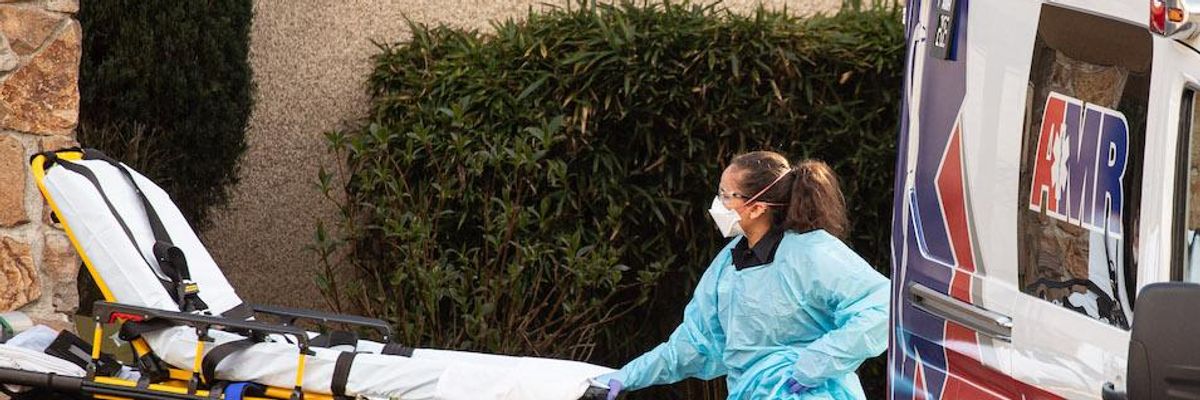Reporting from a number of outlets over the weekend indicates that the White House response to the global coronavirus outbreak was aimed more at President Donald Trump's political goals and less at public health, raising questions about what could have been done differently had the administration prioritized healthcare and safety over the president's ego and aims.
In an early morning tweet Monday, Trump claimed that the disease was being handled and blamed Democrats for trying to use the outbreak as a political attack.
"Dems were working the Impeachment Hoax," the president tweeted. "They didn't have a clue! Now they are fear mongering. Be calm & vigilant!"
As Politico reported Monday, the president's assurances are incompatible from the reality on the ground:
Aside from his criticism of Democrats, Trump also wrote online Monday morning that he would be "meeting with the major pharmaceutical companies today at the White House about progress on a vaccine and cure" to the coronavirus. "Progress being made!" he tweeted.
Despite the president's claims that a coronavirus vaccine could be forthcoming, health officials have consistently said that such a medicine is likely many months away from completion.
The Washington Post over the weekend detailed the administration's response to the disease and raised questions on how the White House is dealing with the coronavirus and managing the Centers for Disease Control (CDC) response.
On February 29, the Postdetailed how Trump's main concern as the potential for a viral outbreak heightened in the U.S. was that he was being treated unfairly by the media, that health officials offering candid assessments of the threat posed by the disease were making him look bad, and that the panic was affecting the stock market. That led to the president downplaying the danger posed by the disease and encouraging conspiracy theories calling the outbreak a "hoax."
The Post also reported Trump knowingly lied about the disease spread in a press conference in an attempt to soothe markets.
The president has assigned managing the virus to a team of health industry-connected officials who have interests in profiting off of the disease, Sharon Lerner reported for the Intercept Saturday, and over the course of his presidency "shut down the National Security Council's global health security unit and cut $15 billion in national health spending, including funding for the management of infectious global diseases at the CDC, DHS, and HHS."
CNN, on March 1, described how the CDC has failed to share information about recovered patients to doctors around the country--a necessity in handling an outbreak of this magnitude:
The CDC is the federal agency that communicates with physicians about how to handle outbreaks. Whether it's SARS, Ebola or last year's measles outbreak, the agency uses information from cases around the world--and in particular the United States--to advise doctors on how to diagnose, evaluate and treat diseases.
The federal agency possesses such information about several US coronavirus patients, but has not released it. That means doctors who now unexpectedly find themselves treating new coronavirus patients aren't able to benefit from the findings of doctors who preceded them.
The CNN article came hours after an Axios report on the contamination of some coronavirus testing kits from Atlanta that could throw the department's response into doubt.
Citizens for Responsibility and Ethics in Washington (CREW) deputy director Dinald K. Sherman wrote in a Post opinion piece Monday that the president's behavior could have "deadly consequences" for Americans and urged accountability for the administration's response.
"It's no surprise that the president has viewed the emerging coronavirus pandemic through the lens of what would damage or benefit him politically," wrote Sherman.
As the New York Timesexplained Sunday, Trump's insistence on politicizing the outbreak could have detrimental effects on the public's ability to handle the virus. Vanderbilt University infectious disease specialist Dr. William Schaffner warned that the spread of misinformation about the reasons for health warnings and preventative actions--particularly at the highest levels of government--has the potential to make things worse.
"If the public perceives that issues regarding communicable diseases are influenced by political considerations, they will lose confidence in the information," said Schaffner. "That will be to the detriment of all of us."

